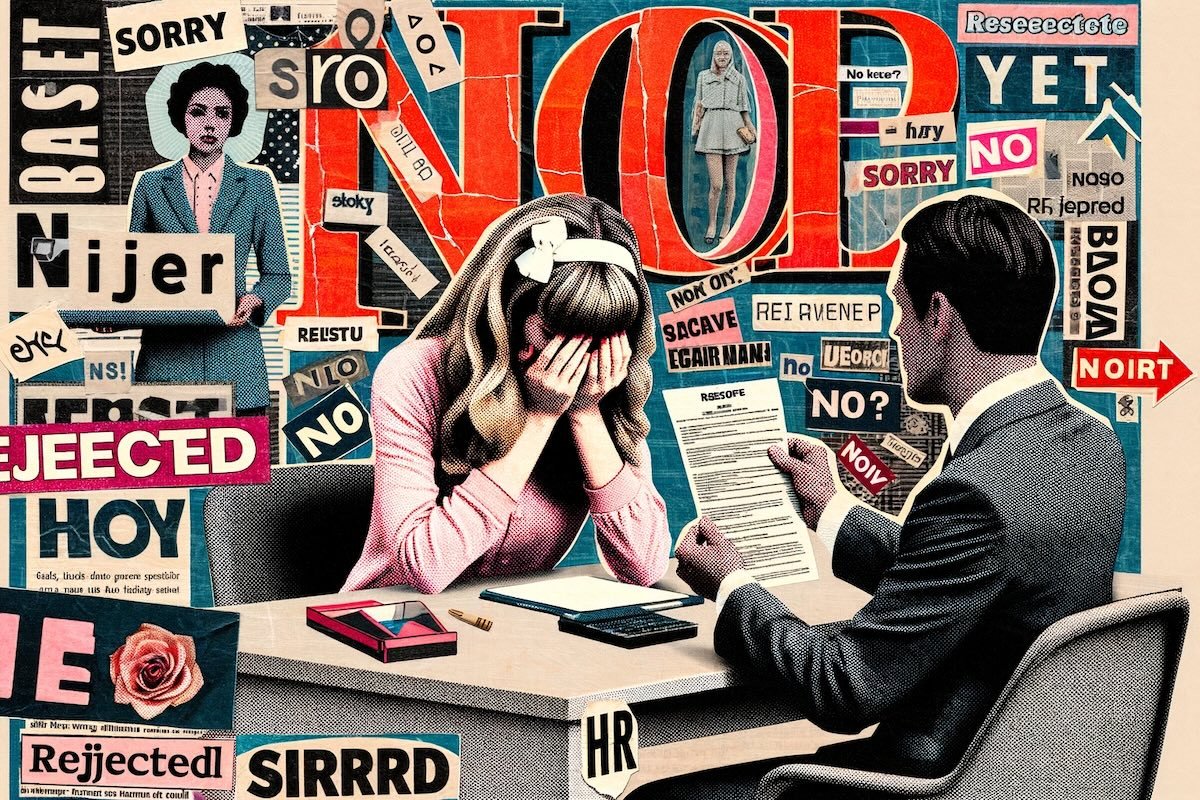There is no shame in a gap in employment.
Should I repeat that a few dozen times?
According to a LinkedIn survey, 62 percent of employees have taken a career break at some point—and 35 percent would be interested in one in the future. If your resume ends up in a pile with 100 others, most of those resumes will include some employment gap.
In fact, LinkedIn even added a
Career Break feature, allowing users to mention and explain their employment gaps on their LinkedIn profiles.
When discussing career and resume gaps, one of the most common questions we encounter is about the stigma around them. Certainly, leaving a resume gap or explaining personal circumstances to a prospective employer never feels quite comfortable.
Unfortunately, speaking up about career breaks can also leave job seekers vulnerable to hiring bias related to parenthood, health (including mental health), stability, and overall dependability.
However, resume gaps are increasingly common, especially after the last two decades have included recessions, a pandemic, and a seesaw of economic instability that doesn't help create long-term job security.
Table of Contents
In this article, we will explore some common reasons for gaps in work history, how to discuss them with recruiters and hiring managers, and the red flags a job seeker should keep in mind when discussing gaps with potential employers.
How to Explain a Gap in Employment to Act as a Caretaker
Explaining a gap in employment for family reasons can be done professionally and honestly. Since there are different responsibilities when it comes to caring for a sick or elderly family member instead of nurturing a newborn or adopted child, we separated this into two sections.
Parenting
Welcoming a newborn or adopting a child should be the most exciting time of your life. In a perfect world, new parents wouldn't need to worry about work or employment during that time. However, the world isn't a perfect place, and there is still a lot of bias against working parents.
Explaining a gap in employment because you welcomed a new child into your home or because you raised entire humans from diapers to high school should be pretty straightforward. However, it's easy to feel like you're out of the loop, especially if caring for your children has taken you out of the workforce for several years.
In my opinion, you'll never meet someone who can prioritize, plan, problem-solve, and multitask like a parent. Parenting requires a diverse set of skills—including time management, problem-solving, and communication. These are all very valuable skills in the workplace. Begin by highlighting some of those skills along with others you've acquired.
Even if you weren't working in a traditional job, you likely developed skills important workplace skills. Managing household finances, organizing schedules, and coordinating activities are all transferable skills that can be relevant to many jobs.
Don't be ashamed or embarrassed about your gap in employment. Frame the employment gap as a conscious choice you made to prioritize your family. Employers appreciate honesty and authenticity. Explain your career break with confidence and pride.
"After having my children, I decided to take some time away from my career to focus on raising them. It was a fulfilling and rewarding experience, but now I'm eager to re-enter the workforce and apply my skills and expertise in a professional setting once again."
Caregiving
Clearly state that you took time off to attend to family responsibilities or to support a family member in need. This could include caring for children, elderly parents, or a spouse/partner. This can be an extremely sensitive topic, especially when it comes to a family member who is ill or even deceased.
How to Talk About a Gap in Employment Due to Caregiving
"I took a hiatus from my career to focus on family responsibilities. During this time, I was the primary caregiver for my elderly parent, which required a significant amount of time and attention. While I wasn't formally employed during this period, I remained actively engaged in [mention any relevant activities, such as volunteer work, freelance projects, or professional development]. I'm now excited to re-enter the workforce, and I'm confident that the skills and experiences I've gained during my time away will be valuable assets in this role."
How to Explain a Gap in Employment for Career Change
Explaining a gap in employment due to a
career change requires thoughtful framing. Emphasize your motivation, the proactive steps you took during the gap, and how the change aligns with your professional goals.
If your gap was recent, customize your explanation to the specific job you are interviewing for. Be sure to highlight aspects of your career change that are most relevant to the position or company you're applying to—and communicate your excitement to put your new skills to work.
If your gap was a few years ago, explain how you brought your skills to work and rebuilt your new career.
"I took a deliberate break from my previous career to pursue a new direction that aligns more closely with my long-term goals and passions. During this time, I immersed myself in [mention any relevant activities, such as training, networking, or gaining experience]. This period of exploration and growth has equipped me with valuable insights and skills that I'm eager to apply in [new career field]. I'm excited about the opportunities this career change offers for personal and professional development, and I'm fully committed to making a meaningful contribution in this new role."
How to Explain a Gap in Employment to Pursue Education
This should be one of the easier gaps in employment to explain, especially if the
education and any degrees acquired relate to your current career. Employers generally view An education break positively, as it demonstrates your commitment to self-improvement and lifelong learning.
Even if you weren't in a traditional work setting during your education gap, you likely gained valuable skills such as
leadership, time management, research abilities, critical thinking, and teamwork. Highlight how these skills are applicable today.
"I took a hiatus from my career to pursue further education in [mention your field of study]. Recognizing the importance of staying current in an ever-evolving industry, I enrolled in [name of program/institution] to deepen my understanding of [relevant subject matter].'
How to Explain a Gap in Employment Due to Illness
Explaining a gap in employment due to illness requires a delicate balance.
So, I created this acronym to make something difficult feel (hopefully) a little easier. I call it the HERO explanation. It stands for Honesty, Emphasis, Recovery, and Outcome
- Honesty: Be honest while practicing professional discretion. If you feel comfortable doing so, acknowledge the gap in your employment history and briefly mention that it was due to health reasons. You don't need to disclose the specific nature of the illness unless you're comfortable doing so.
- Emphasis: Emphasize that you took time off to prioritize your health and well-being.
- Recovery: If appropriate, communicate the status of your recovery. If you suffer from chronic illness, explain how you manage and adapt your lifestyle.
- Outcome: Discuss any positive outcomes or personal growth resulting from your illness. For example, you may have developed resilience, gained a deeper appreciation for health, or learned valuable coping mechanisms.
It's not easy to talk about illness, whether physical or mental. Depending on your comfort level, you might want to explain this gap in employment as personal reasons—and we will get into that later in this article.
Whatever you decide, deliver your explanation with confidence and
positivity. Show that you've moved past the illness and are ready to engage in your career again fully.
"During the gap in my employment history, I faced some health challenges that required my full attention and dedication to recovery. I took the necessary time off to focus on my health and ensure that I could return to work at my best. While it was a difficult period, I'm grateful for the opportunity it gave me to prioritize self-care and well-being."
How to Explain a Gap in Employment Due to Layoff
Ah, the layoff!
This is both the simplest and most difficult gap in employment to explain. While many employers understand why layoffs happen, it can feel quite personal to be
caught up in a layoff—especially when it ends in a prolonged career break.
Start by acknowledging the layoff and the gap in your employment history. By leading with transparency and confidence, a job seeker takes their power back. Some layoffs are highly publicized, meaning the recruiter or hiring manager might already know the details surrounding it. However, be prepared to explain whether your layoff was due to company restructuring, downsizing, or
other factors beyond your control. Keep the explanation concise and professional.
"After being with my previous company for several years, I experienced a layoff due to [mention reason, such as restructuring or downsizing]. Following the layoff, I took the opportunity to assess my career goals, update my skills, and explore new opportunities."
How to Explain a Gap in Employment to Pursue Volunteer Work or Opportunity
Explaining a gap in employment to pursue volunteer work or an opportunity for personal development can be seen positively by employers. This kind of gap demonstrates an initiative, commitment to growth, and dedication to serving others. This is an especially positive reason for a career gap in professions geared towards service to others.
Explain why you decided to pursue volunteer work or seize the opportunity, emphasizing your passion for the cause or the value you saw in the experience. Show your commitment to making a difference and your willingness to step outside your comfort zone. Highlight the skills you gained or developed during your volunteer work or experience, emphasizing their relevance to your next career move. This could include communication skills, teamwork, leadership, problem-solving, or specific technical skills.
Finally, share any
notable achievements or contributions you're particularly proud of. Discuss your impact on the organization or community and how your efforts helped further their mission or goals.
"During the gap in my employment history, I had the opportunity to immerse myself in volunteer work [or specify the opportunity]. I was drawn to this experience because of my passion for [mention the cause or field], and I saw it as a chance to make a meaningful impact while also developing new skills. During this time, I [mention specific responsibilities or achievements], which strengthened my abilities in [mention relevant skills]."
How to Explain a Gap in Employment to Take a Sabbatical
If you're explaining a career gap due to a planned sabbatical, focus on your growth, commitment to personal and professional health, and how it affected your outlook on your career going forward. Because sabbaticals are still pretty uncommon (though they are becoming more popular in theory), be ready to answer some questions about your sabbatical.
Briefly illustrate why you took a sabbatical, emphasizing your desire for personal growth, rejuvenation, and gaining new experiences or perspectives. This demonstrates your commitment to self-improvement and holistic well-being.
"I took a planned sabbatical from my career to focus on personal growth, rejuvenation, and gaining new experiences. During this time, I [mention activities or experiences during your sabbatical, such as travel, volunteering, learning new skills, etc.]. The sabbatical provided me with valuable insights and perspectives that I believe will benefit me both personally and professionally. I'm now excited to return to the workforce with a renewed sense of enthusiasm and energy. I'm eager to apply the lessons learned during my sabbatical to contribute positively to [company/position]."
How to Explain a Gap in Employment Due to Freelancing
Hey there, freelancers!
More often than not, "career breaks" are a huge misnomer. Ask any parent navigating parental leave, any full-time caretaker, or anyone navigating the freelance world. In this day and age, it's easy to declare that "nobody wants to work anymore!" The real story is that, even on a "career break", many of us are working harder than ever before.
If you spent your career gap pursuing freelance work, consulting gigs, or other part-time employment opportunities, explain that.
For better or worse, it's increasingly common for employees to have side hustles or freelance gigs to subsidize their income, build skill sets, or safeguard themselves against a potential layoff.
How to Explain Gap in Employment Due to Personal Reasons
Let's talk about personal reasons. In other words, you may not want to share the entire story behind your career gap—especially if you took time to address illness, burnout, a loss, or other life experiences.
In my personal opinion, the potential for a paycheck does not give any employer the right to your entire personal story. Human curiosity can often come into play when discussing resumes, professional experience, and a career story. That doesn't mean job seekers should feel pressure to share more personal details than they are comfortable disclosing.
How to Talk About A Resume Gap Due to Personal Reasons:
In cases where you'd like to cite personal reasons and move on, redirect the conversation. Here's an example of how an interviewee might squash probing questions about a career gap.
Addressing a Career Gap from Several Years Ago
Hiring Manager: Can you explain this career gap between March 2015 and May 2016?
Job Seeker: "During that period of time, I made a deliberate decision to take time off from my career to address some personal matters. In that time, I dedicated myself to continuous learning and skill development. I pursued online courses, attended workshops, and engaged in relevant projects to stay updated and enhance my skill set. This break allowed me to strengthen my abilities, and bring them to my next role where I used my upskilling to further my career."
Addressing a Career Gap That is Still Active
Hiring Manager: Can you explain why you have been on a career break for the past two years?
Job Seeker: During the past year, I took a planned career break due to personal reasons. It was a challenging period that required my full attention and commitment. However, I utilized this time to focus on personal growth, self-reflection, and resolving matters. I'm now eager and prepared to return to the workforce, bringing with me renewed energy, perspective, and dedication to my professional endeavors.
Resume Gap FAQ
Before we go into the most common reasons for career breaks, let's address what constitutes a career gap.
Is three months between jobs considered a career gap?
Any hiring manager or recruiter is well enough aware that the job search, especially in a season following rampant layoffs, can take five months or longer.
How long is too long when it comes to a career break?
However, the length of a career break will rely on other factors. How many years into your career were you before the break? What is the state of the job market, especially in your industry? Can you explain the length of your career break? Did you take a break to pursue education or a higher degree? Were you the caretaker for young children or an ill family member?
What's a good reason for a career gap?
There are many "good" reasons for employment gaps. As a job seeker, deciding what to share about your pause is up to you. In many cases, it's best practice to prioritize talking about your valuable skills and qualifications.
Dos and Don'ts of Employment Gaps
Last but not least, here are a few dos and don'ts to consider when discussing a gap in employment on your resume.
- DO Share what you feel comfortable sharing.
- DON'T Feel pressured to provide details or context that feels uncomfortable, irrelevant, and overly personal. This might be a major red flag if a hiring manager pushes you to provide more context.
- DO explain your career gap in your cover letter, especially if you can use it to elaborate on how it impacted your personal and professional development.
- DON'T worry about career gaps that are more than ten years old. Resumes typically do not need to cover more than 10 or 15 years unless you're looking for a leadership role.
- DO Emphasize the new skills, coursework, or professional development you worked in during a career gap.
- DON'T allow a few questions about a resume gap to distract from your entire career, accomplishments, and achievements that came before and after any employment gap.
- DO explain what you learned through your gap and how you want to apply it to your next full-time job.
- DON'T feel as if you need to use a chronological resume. If a skills-forward functional resume format suits your career journey better, use it.
- DO be upfront about your career gap instead of hoping it "doesn't pop up" in the interview.
- DON'T overexplain any resume gap. Keep it simple, and be prepared for follow-up questions if they arise.












